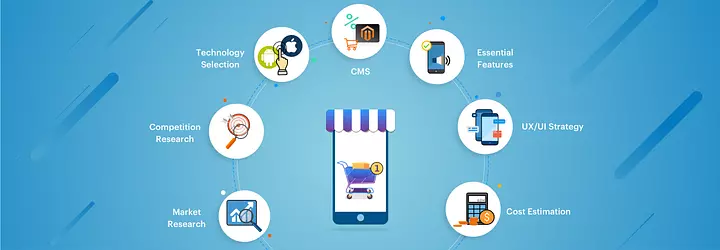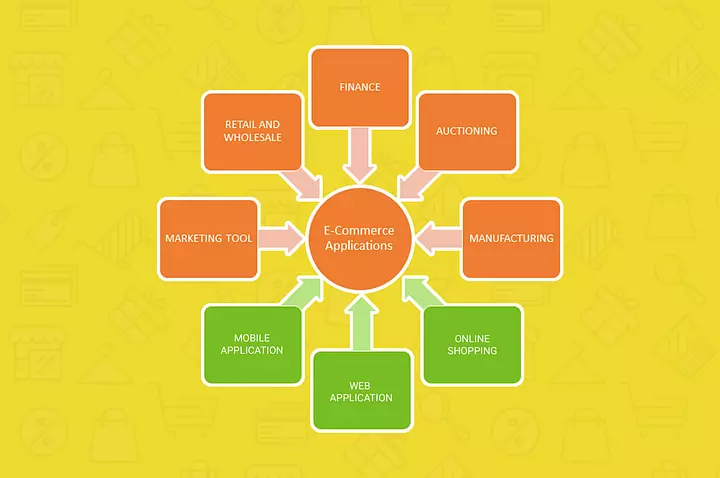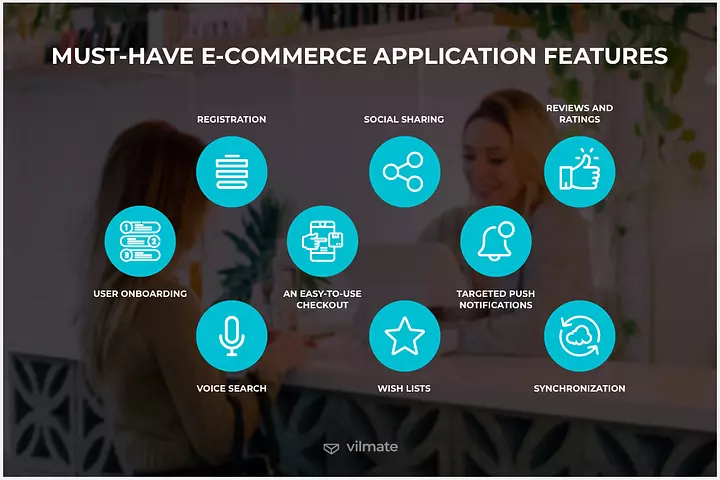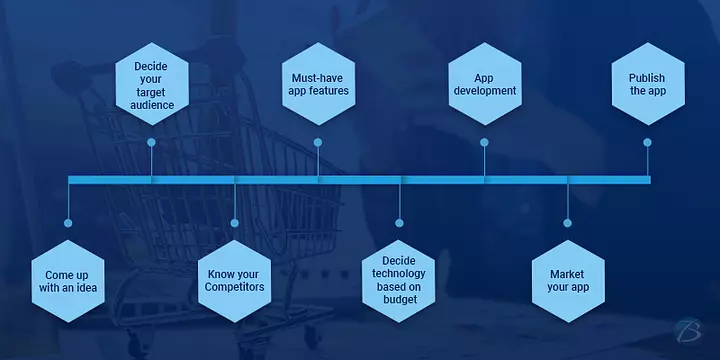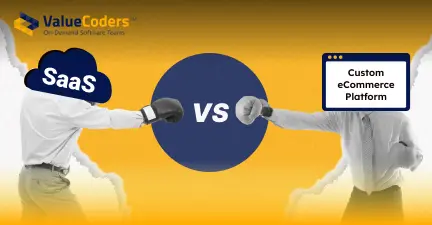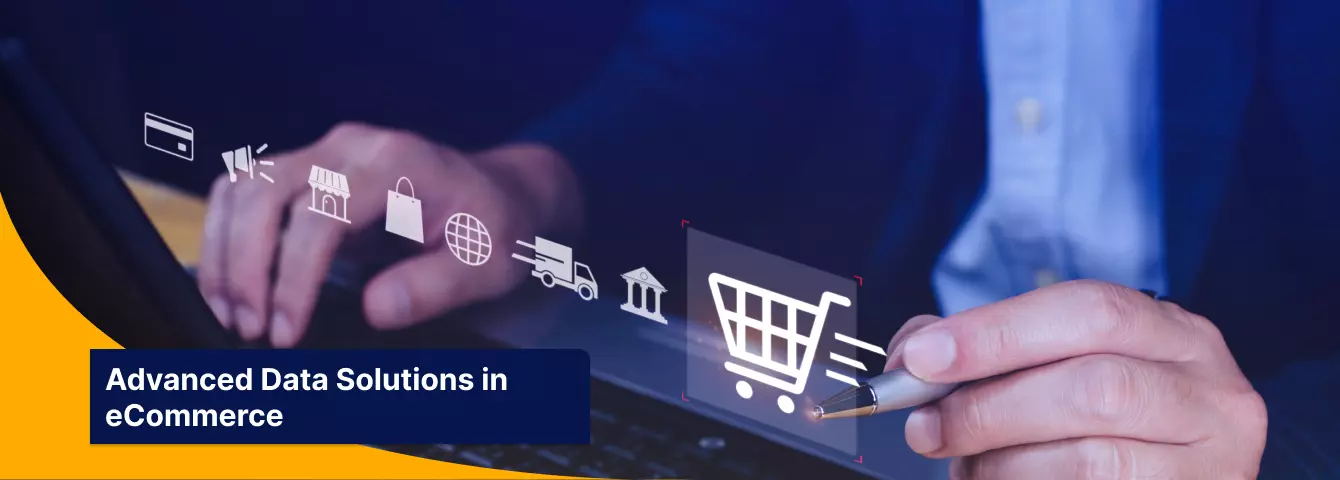The Internet has made it possible for businesses and consumers to stay connected all the time. This seamless connectivity has also impacted the buying habits of consumers worldwide. From online retail giants like Amazon to newly launched startups, all are working relentlessly to increase their consumer base.
As a result, eCommerce is quickly transforming into mobile commerce. With the number of mobile and tablet users increasing, eCommerce companies are looking at eCommerce app development as an investment, not an expense.
If you’re considering building an eCommerce app, we can help you decide on the best approach to getting started and growing.
Need for eCommerce Application Development
When around 80% of consumers are using their smartphones to make purchases online, the importance of having an eCommerce app cannot be overlooked. Let’s look at the benefits of eCommerce apps that will help you make a better decision.
- An eCommerce app benefits both small and new businesses and attracts customers easily
- Millennials, one of the primary segments of online consumers, prefer buying on mobile devices
- eCommerce app helps in brand building and better customer service
Giving a personalized and more responsive experience attracts more customers. They can shop on the go while traveling, having a meal, or while exercising without the need to carry heavy laptops.
Now, let’s move to the approach a business should take for Ecommerce app development But, before that we will learn the types of eCommerce apps.
Also Read: Pick Out The Best Open Source E-Commerce Platform For Your Projectour Project
eCommerce App Types
There are mainly four categories of eCommerce apps:
1. Business-to-Business (B2B) eCommerce App
Applications that enable businesses to exchange their goods or services via mobile channels are called B2B eCommerce apps. Alibaba is one of the most popular examples of this type of app, wherein retailers can directly connect with manufacturers to purchase a product.
2. Business-to-Consumer (B2C)
One of the most common and widely used application types is a B2C app, which enables a business to sell its product directly to the consumer without the need for a retailer. Amazon is a well-known example of this type of app.
3. Consumer-to-Consumer (C2C)
These types of apps are meant for consumers to exchange their products or services with consumers. OLX is an example of a C2C eCommerce app, wherein buyers and sellers can connect without needing a middleman.
4. Consumer-to-Business (C2B)
Some businesses act as buyers for products and services such as design, content, etc. Upwork and Github are some platforms that connect consumers or professionals with businesses.
Increase sales, engage customers, and boost your brand presence with a fully customized app!
Developmental Components of eCommerce App
Every business has different goals, and what components should be added depends on those parameters. However, some developmental components of eCommerce apps are common:
-
Multimedia Content
An application will have images, videos, texts, graphics, etc to make the user journey seamless and engaging.
-
Servers
It is essential to have powerful servers that can support large quantities of different types of content. The server should be reliable, robust, and secure at the same time.
-
Information Exchange
Information exchange in eCommerce apps mainly uses wireless, cable, and telecommunication services.
-
Device Access
Different users install apps on different devices. For example, some might access Netflix on television, while others will use it on a mobile, laptop, or tablet. Therefore, it is important to consider device access when developing the application.
Must Read: Top Magento Companies To Choose For Your ECommerce Project
Features Your Ecommerce App Must Have
Certain features must be included in the eCommerce application development phase. These will give customers a seamless online shopping experience while ensuring your business’s success.
1. Inventory Management
Your app should provide inventory management functionality so customers can view and track product availability before purchasing. This will help reduce the chances of customers being disappointed when a product is sold out.
2. Order Processing
E-commerce applications should provide order processing functionality to manage and track orders easily. This will ensure your business runs smoothly and customer orders are processed quickly.
3. Shipping
Ecommerce apps should include shipping functionality so customers can easily view shipping rates and delivery times before purchasing. This will help reduce the chances of customers being disappointed with their purchase due to unexpected shipping costs!
4. Order Tracking
Ecommerce applications should include order tracking functionality so that customers can track the status of their orders at any time. This will help reduce customer frustration and increase satisfaction with your business!
5. Customer Management
Applications with customer management functionality allow you to manage all your E-Commerce users, such as shoppers, store managers, admins, etc. This is a significant way to keep track of your business. Moreover, it is the most sought-after feature in custom e-commerce software development to ensure effective customer support & personalization of services.
6. Shopping Cart
E-commerce applications should include shopping cart functionality so customers can easily add products to their purchases. This will help reduce the chances of customers leaving your e-commerce store without making a purchase.
7. Register & Login
Applications should include simple registration and login functionality so customers can easily sign up for your E-Commerce store. It will help reduce the chances of customers being frustrated by application features.
Customers need an Ecommerce account to purchase products from your online store.
8. Analytics
Applications should include analytics functionality to help you understand how your E-Commerce store performs. This will allow you to make improvements and better target potential customers.
Analytics will show information such as the Number of Visitors, Ecommerce Sales Conversion Rate, Ecommerce Mobile Stats, etc. Once Analytics has been configured, it can be easily viewed within the ecommerce application.
Expand your reach and grow your revenue with a powerful ecommerce mobile app.
9. Push Notification In Ecommerce App
Push notifications are among the most important features to include in your e-commerce app. This will allow you to stay in touch with your customers and send them updates about new products, sales, and more.
10. Social Media Platform Integration
Another essential feature to include is social media platform integration. This will allow your ecommerce app users to share their purchases on Facebook, Twitter, and other platforms, which will help increase sales even more!
11. Popup Notifications
If you want your customers to take advantage of an offer or sale that’s happening right now, popup notifications are the way to go. These notifications will appear as a small window on the screen and can be customized to include images, text, and even videos.
12. Cart Abandonment
One critical problem with online shopping is cart abandonment. This happens when people add items to their cart but leave the site without checking out. A popup notification can remind customers of their abandoned carts and encourage them to complete the transaction.
13. One-Page Checkout
The last feature that you should consider adding is a one-page checkout. This will allow your customers to quickly check out without going through multiple pages every time they purchase. It is usually observed that people forget essential details such as shipping address or contact number when purchasing a product in a hurry. Having a one-page checkout will be of great help.
As we can see, there are many features that you must include in your eCommerce solution. Hire ecommerce developers with comprehensive expertise in coding & business logic so that they can create a solution by understanding users’ interests & business requirements.
Providing these essential features will increase customer satisfaction and ensure your business’s success.
Also Read – A Comprehensive Guide To Create An Ecommerce App From Scratch
Steps To Follow While Creating An Ecommerce App
#1. Customer Needs Assessment
The first step in ecommerce mobile app development is to identify your customers’ needs. What are your customers looking for in an app? What features would make their shopping experience easier and more enjoyable? Consider these things mindfully as you design your wireframes and storyboards.
#2. Create a design for your app
Once you know what your customers want, it’s time to start designing your app. This will involve creating wireframes and storyboards showing how the app looks and functions. Having a solid design before you start coding is important, as this will help ensure a smooth e-commerce application development process.
Drive growth and innovation in your online business with a tailored ecommerce app.
#3. Decide Programming Language Stack
Pick a programming language that you want to use. Many languages can be used for mobile app development, such as Objective-C, Swift, for iOS apps, and Java for Android. If your business already has a large team of e-commerce developers who know one of these languages, it looks suitable to stick with it so they don’t have to learn anything new.
#4. List of requirements & start coding
Once you have a good design and the language your team will use, it’s time to start coding. You’ll need an API (Application Programming Interface) and a backend so that your app can function and connect to your company’s databases. Make sure you don’t forget about legal issues such as copyright infringement! Your IP attorney should help you find all potential problems before it’s too late.
#5. Intensive Testing
The most successful apps are those with good reviews, customer feedback, and ratings. You can improve your app’s rating by constantly listening to customer feedback and implementing changes based on what they say. Once your ecommerce development company and you’re confident everything is working as it should be, release your ecommerce app.
#6. Continuous Upgradation For Ecommerce Development
Developing an ecommerce app is never really done. There are always new features and updates to consider. Ensure you have a team to handle these tasks so your app remains up-to-date and compliant with all legal requirements.
The steps above provide a general overview of the process of developing an e-commerce app. By following these steps, you can create a successful app that meets your customers’ needs and helps your business grow.
Also Read: A Comprehensive Guide To Launch eCommerce Business
Wrapping Up
Ecommerce apps are the future. If your business is not developing an app for customers, it will soon be left behind in the dust. Keep in mind that building an ecommerce app is never really done.
There are always new features and updates to consider. Ensure you have a team that can handle these tasks so your app remains up-to-date and compliant with all legal requirements.
Expert ecommerce developers always have to assimilate new trends in solutions to cater to a solution that keeps users hooked. So, connect with a deft ecommerce development company with excellent expertise.

